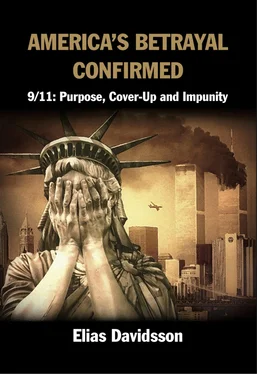(c) A credible threat
Credibility does not necessarily mean that the adversary must represent a true threat. It rather means that the public must perceive the threat as credible. Since the beginning of the 20th century, Hollywood films have portrayed Arabs and Muslims as devious and threatening creatures. Author Shaheen who undertook the Sisyphean task to examine Hollywood’s treatment of Arabs (he watched more than 1,100 films), could hardly find examples before 9/11 in which Arabs or Muslims were represented as ordinary human beings, let alone as people deserving respect and admiration.
In the introduction to his revealing work Reel Bad Arabs, Shaheen wrote:
Seen through Hollywood’s distorted lenses, Arabs look different and threatening. Projected along racial and religious lines, the stereotypes are deeply ingrained in American cinema. From 1896 until today, filmmakers have collectively indicted all Arabs as Public Enemy Nr. 1 – brutal, heartless, uncivilized religious fanatics and money-mad cultural ‘others’ bent on terrorizing civilized Westerners, especially Christians and Jews.{56}
Shaheen discovered parallels between the depiction of Arabs by Hollywood and that of Jews in Nazi films: both project images of hook-nosed, scheming and lecherous persons lurking in the shadows to prey upon innocent Christians.{57}
Regarding the depiction of Muslims, who are widely regarded in the West as “Arabs,” Shaheen writes:
Islam, particularly, comes in for unjust treatment. Today’s imagemakers regularly link the Islamic faith with male supremacy, holy war, and acts of terror, depicting Arab Muslims as hostile alien intruders, and as lecherous, oily sheikhs intent on using nuclear weapons. When mosques are displayed onscreen, the camera inevitably cuts to Arabs praying, and then gunning down civilians. Such scenarios are common fare.{58}
Shaheen discusses more than 900 feature films displaying Arab characters, the majority as villains.
Western audiences, fed on Hollywood fare, have no difficulty conceiving of Arabs and Muslims as potential terrorists. No other group of people could better fulfill that role.
(d) A useful threat
A substantial portion of world oil resources is located under the feet of Muslims and oil has been and remains for the United States a strategical commodity. This was made clear by James R. Schlesinger, when he addressed the House of Representatives on 15 January 1991:
Mr. Chairman, you and Senator Warner have posed the question, “What are America's interests in the Gulf?” I shall mention three and leave it to the committee to decide whether they are in ascending or descending order of importance. First is oil; there is no way of evading this simple reality. Oil provides the energy source that drives the economies of the industrial and underdeveloped worlds. Were the principal exports of the region palm-dates or pearls or even industrial products, our response to Iraq's transgression would have been far slower and far less massive than has been the case. Nonetheless, this should not be misunderstood. Our concern is not primarily economic. [...] Instead, our concern is strategic; we cannot allow so large a portion of the world's energy resources to fall under the domination of a single, hostile party.{59}
Some Muslim countries are regularly accused by the United States and its allies of sponsoring international terrorism.{60} Such accusations are leveled in order to justify threats, economic sanctions and military interventions. Among those accused of supporting terrorism are countries named by Wesley Clark in a speech he held in 2007 at the Commonwealth Club in San Francisco. According to him the following seven countries were targeted by the U.S. government for regime change after 9/11: Iraq, Syria, Lebanon, Libya, Somalia, Sudan and Iran.{61} For unexplained reasons Afghanistan, the first country attacked after 9/11, was not on the list.
Another benefit for choosing the specter of Islamic terrorism as the new threat, was that large Muslim communities live in Western countries. The claim of having to uncover Islamic terror cells allegedly ensconced within Muslim communities will later be used in justifying a panoply of government oppressive measures, such as the surveillance of entire populations, increased government secrecy and the erosion of the rule of law. Where such cells did not exist, the FBI created them. From a governance perspective, such measures have always been desirable.
(7) Building up Osama bin Laden as a global threat
The promotion of an Islamic terrorist threat began massively in 1998 with the building of the icon of villain Osama bin Laden, who had relocated from Sudan to Afghanistan in 1996. Since 1998 he was presented by Western media as a serious international threat, whose opinions were worth analyzing and commenting upon, as if he were a leader of a super-power. Eminent journalists were sent to interview him at his retreat in Afghanistan. Describing him as a threat to Western interests bore no relation to reality, since he had no army, planes, missiles, tanks, submarines, banks, or mass media. He relied on Western technology for his communications with the outside world and on Western media to promote his views. Apart from his verbal exhortations, he had nothing with which to threaten any state, let alone the national security of the United States. By the time 9/11 occurred, the public mind had already been prepared to regard him as the most probable suspect.
As 9/11 approached, the alleged bin Laden threats became increasingly shrill, as if to prepare the American public for the coming attack. The press agency UPI, for example, disseminated the following scare dispatch to its subscribers on 6 April 2001 (byline Richard Sale):
The threat of attack by terrorists linked to Islamic extremist Osama bin Laden Friday caused the United States to close three of its embassies in South America, according to U.S. intelligence officials. The embassies closed were in the capitals of Uruguay, Paraguay and Ecuador. A U.S. intelligence official said, “It's best to take the worst case scenario.”
Another U.S. government official said; “There was a certain level of huffing and puffing” being intercepted between cells of known and suspected bin Laden operatives, and U.S. security specialists had the “feeling we should take certain precautions.”
According to a source, the tip on bin Laden came from Argentine intelligence. “Of all the groups in the area, Argentina is most dedicated to fighting terrorism,” he said.
The tri-border area between Argentina, Paraguay and Brazil has been described as a bin Laden terrorist “nerve center,” according to one expert U.S. government official who spoke on condition of anonymity. “It's a tremendous network, and there were indications it was being activated for something specific,” he said.
Bin Laden operatives had arrived “over a period of time” apparently for the purpose of carrying out special missions. Local Shiite Muslims put up the operatives in their homes, helped them move around, furnished them with maps and diagrams of various target areas, he said.
In the three years leading to 9/11, I found Osama bin Laden mentioned in more than 600 English-language news reports every month on the average. According to one study, CBS and NBC News published significantly more stories mentioning Bin Laden in 2000 than those mentioning Britain’s Prime Minister Tony Blair and Germany’s Prime Minister Gerhard Schröder. Shortly after 9/11, Osama bin Laden was mentioned more often in American media than the U.S. President himself.
Yet, after 9/11 the U.S. leadership lost interest in the man. At a press conference held on 19 September 2001, President George W. Bush was asked: “Do you to your mind have irrefutable evidence that links al Qaeda, and specifically Osama bin Laden to these attacks?” He answered: “When we take action, we will take action because we believe -- because we know we'll be on the right. And I want to remind people that there have been terrorist activities on America in the past, as well [...] This is a war not against a specific individual, nor will it be a war against solely one organization.” In President Bush’s Address to the Nation of 7 October 2001, he did not even mention Bin Laden or any nexus between Afghanistan and 9/11. In President Bush’s Press Conference of 13 March 2002, a journalist asked: “Mr. President, in your speeches now you rarely talk or mention Osama bin Laden. Why is that?” The President’s answer: “Deep in my heart I know the man is on the run, if he’s alive at all. Who knows if he’s hiding in some cave or not; we haven’t heard from him in a long time [...] So I don’t know where he is. You know, I just don’t spend that much time on him, Kelly, to be honest with you.”{62}
Читать дальше












